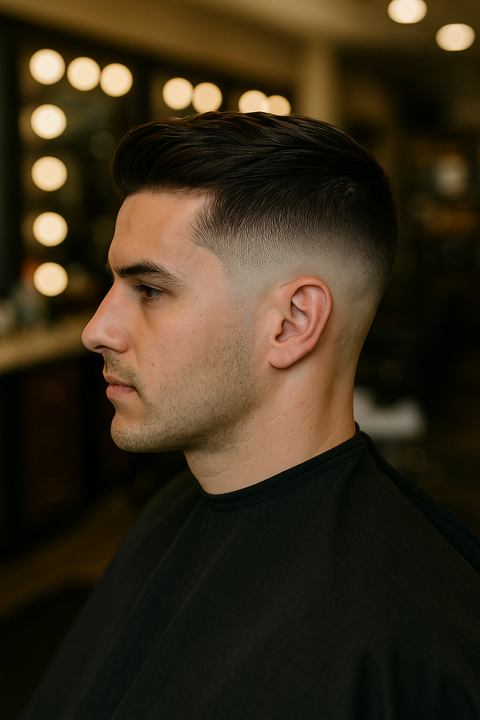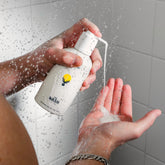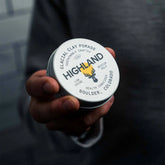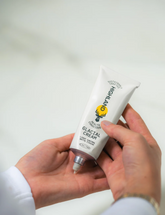
Best Low Taper Fade Hair Styles That Work for Modern Men
Want a fade that looks sharp Monday through Friday without constant maintenance?
That's exactly why the low taper fade remains the MVP of men's haircuts in 2025.
It's clean enough for your boss, cool enough for your weekend, and doesn't require daily babying.
Before diving deeper into specific styles, check out our comprehensive low taper fade guide for everything from examples to maintenance basics.
Now let's match you with the perfect fade.
Quick primer: Taper vs. Fade
Think of a taper as a subtle blending—the hair gradually gets shorter from top to bottom, blending seamlessly at the sides.
A fade goes bolder, cutting down to skin (or near-skin) using clipper guards like a #0, #1, or #2, then blending upward with precision.
A low taper fade sits right at the natural hairline, starting around the temples and ears—the perfect zone that works for almost every face and profession.
Mid and high fades push further up the head, giving you more contrast and edge if that's your vibe.
Best Fades by Hair Type
Skip the guesswork: Your hair texture dictates which fade variations will work hardest for you
| Hair Type | Best Fade Style | Why It Works | Maintenance Level |
| Straight | Classic Low Taper | Clean lines stay crisp longer. Natural fall creates effortless volume on top. | Every 3–4 weeks |
| Wavy | Textured Low Fade | Works with your natural movement. Waves disguise grow-out beautifully. | Every 4–5 weeks |
| Curly | Low Drop Fade | Follows your head shape. Creates contrast without fighting your curl pattern. | Every 2–3 weeks |
| Tight Curls | Shadow Fade | Gradual blend complements dense texture. No harsh lines to maintain. | Every 2–3 weeks |
| Thick | Bald Taper Fade | Removes bulk at sides. Keeps weight manageable without thinning shears. | Every 2–3 weeks |
| Thin/Fine | Soft Low Taper | Maintains coverage. Avoids harsh contrasts that emphasize thinning areas. | Every 4 weeks |
Here's what separates a good fade from a great one:
A skilled barber uses the scissor-over-comb technique on top—controlled, precise, and never harsh—then switches to clipper blending on the sides for that seamless transition.
They'll use a fade comb to guide the clipper, ensuring consistent guard lines (usually #1.5 or #2 into skin) and softer blending in between.
The result? Cleaner lines that hold their shape longer, softer transitions that look intentional, and a cut that stays sharp even as it grows out.
Pair that with Highand pomade, and you've got a fade that doesn't just look good—it looks effortless.
Fades by Lifestyle & Personality
|
Your Vibe |
The Fade |
Styling Time | Product Needed |
Best For |
| Professional | Conservative Low Taper | 2 minutes | Light pomade | Client meetings |
| Creative Type | Disconnected Low Fade | 5 minutes | Glacial clay Pomade | Agencies, startups |
| Gym Regular | Skin-Tight Low Fade | 30 seconds | Optional pre-styler | Active life |
| Low Maintenance | Natural Low Taper | Zero | None required | Wash-and-go |
| Trendsetter | Burst Fade with Design | 3–5 minutes | Matte clay or cream | Standing out |
| Weekend Warrior | Versatile Mid-Low Fade | 1–2 minutes | Light-hold product | Office to outdoors |
Visual Inspiration
The Executive Low Taper
Clean fade starting at the temple.
Perfect for suits and client dinners.
Zero rebellion, maximum polish.

The Modern Classic
Traditional taper with contemporary texture on top.
Your barber's favorite recommendation for good reason.

The Textured Drop
Fade drops behind the ear for added dimension.
Ideal when you want a subtle personality without going wild.

The Shadow Master
Gradual fade that whispers instead of shouts.
Perfect for first-timers nervous about commitment.

The Bold Statement
Low fade with hard part or design element.
When subtle isn't your speed, but professional is still required.

Barber-Backed Tips for Fade Success
👉 Book morning appointments: Your barber's steadiest hand comes before noon, not after six clients.
👉 Show photos from multiple angles – One front-facing pic won't capture the fade you actually want.
👉 Specify your fade height in inches – "Low" means different things to different barbers.
👉 Ask about their clipper guards – A #1 guard at one shop might be a #2 at another.
👉 Schedule your next cut before leaving – Good barbers book up fast, especially Fridays and Saturdays.
👉 Learn one styling technique properly – Master one method instead of half-learning five.
Looking for a pro barber near you? Use our store locator.
Pro Tools & Products That Make the Difference
Behind every sharp fade is the right equipment and styling products.
Professional barbers trust Andis or Wahl clippers for precision blending—they hold their edge and deliver consistent guard sizes that beginner trimmers can't match. (1)
A fade comb is non-negotiable for guiding the clipper and catching stragglers.
On the product side, stay away from toxic shampoos and creams that actually damage your scalp and the environment.
Highland's approach keeps it simple:
🌱 Clean ingredients that work with your hair, not against it.
🚫 No harsh chemicals fighting your natural texture. No heavy products weighing down your style.
✅ Just straightforward grooming that fits your routine.
Your Fade, Your Rules
The best low taper fade haircut isn't the one trending on TikTok.
It's the one that makes you forget you're wearing product.
The cut that survives your commute, your workout, and your nephew's birthday party without a mirror check.
Find a barber who gets your hair texture. Pick a fade that matches your actual morning routine.
Keep products minimal and natural. Your confidence shows when your grooming feels effortless—and that's when you look your absolute best.
The craft is in the hands, but the results last longer when you finish with prestige products that are science-backed and full of earth-grown ingredients.
Real fades. Real results. No fuss.
References:
- nytimes.com/wirecutter/reviews/best-hair-clippers-for-home-use/





